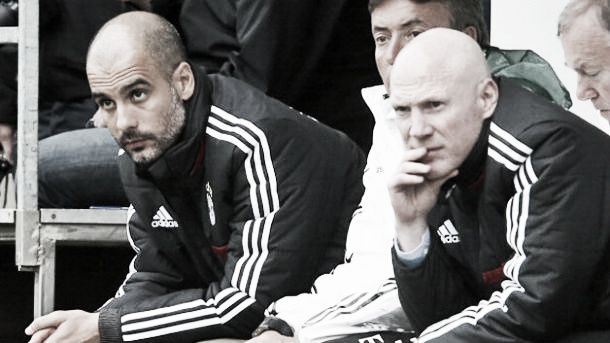Josep Guardiola is clearly a very smart man. He knows football probably better than anyone else in the business and certainly more than me, you and pretty much every single person out there struggling to write about his work on a daily basis. But the beauty of football is that there are many ways of winning, and although he's quite good at it, Guardiola doesn't - and he never claimed to - offer the ultimate answer for football. It's time many of us stop treating his system like an almost perfect way of playing football or, more importantly, like something everyone in the game should aim for. Jürgen Klopp is claimed to have said once that had he grown up looking Guardiola's Barcelona, he'd probably end up playing tennis. That's just as good an opinion as finding the dazzling passing game Guardiola developed in Barcelona a football masterpiece.
Criticism is a key factor of excellence. It's nearly impossible to be the best - in any field - without opening your work to some degree of criticism, even if just your own. Like the great Ronald Scott once said, "it's a long way to the top if you wanna rock'n'roll". The untold side of that story is, however, that it doesn't get any easier once you get there. Once you get a Cadillac, you have to have money for gasoline. Bayern got just one win out of their last five encounters. It may not look that bad since that win sent the Bavarian side to their fourth Champions League semifinal in the last five seasons, but it's not enough for a Bayern side that well... is about to play their third UCL semifinal in a row. It's not solid enough from a side that looked so abundantly stronger, deeper and more experienced prior to the United tie and yet suffered through the European quarterfinals and got just one point from the last nine in the league.
The home loss to Borussia Dortmund on Saturday not only showed a very stretched scoreline (the first Bayern home loss by such a margin in many years), but also a gigantic difference in terms of commitment and individual excellence from both teams. It was somewhat expected that everyone but one man to fall for the whole "the league is done so whatever" speech, and that man was Matthias Sammer. Yet, that was exactly was the Bavarian sporting director said. He dismissed a 3-0 home loss is such a comfortable way that one would be invited to wonder about what could he possibly have done in the summer to change so drastically from the relentless perfectionist from last season to the current conformist we've been seeing lately. More than any tactical changes, more than any major signing, Bayern's policy of "avoiding friendly fire at all costs" it the most important change the club had in the last 10 months.
Bayern, of all teams, should know better than that. The last time they had a great manager doing his job with no constructive criticism from the inside, that last penalty kick found the left post of the Südkurve goal and dreams were shattered. It can be argued that Sammer could've made a difference on that day, but the fact that he was Bayern's first signing after the Fiasco Dahoam and that it (among a few other choices) did pay off after just one season in such a remarkable fashion can't go unnoticed and Bayern should stop taking the effects of such a positive criticism for granted. They don't come for costless, but are the product of building an structure of checks and balances around your work.
Is Guardiola doing a good job? The only reasonable answer to that is 'yes'. It's obvious from his stats and achievements that he's having a successful first season in München so far. So far because April and May are the months of the season when he's really expected to deliver and there are still two major trophies out for grab. Even if Guardiola misses both of them, there's no real reason in asking for his head, not now or in the near future. Then why write this piece? Because if you look the matches and look at how strong the current Bavarian squad is, it's impossible not to find yourself thinking that Bayern could've been putting on better performances on a more regular basis. This team has a really hard time converting an erotic amount of possession into clear-cut chances and, for a team that only lets the opposition have the ball for 20% of the time, Neuer has been requested to do a miracle or two too many almost every week. A lot of answers pop up from many sources and they all look somehow valid: we're slow in possession, some players are struggling out of position, some others don't look committed, opposition parks the bus... the list goes on. Everyone seems to have something to offer to this discussion. Everyone but Matthias Sammer.
It's completely understandable that Guardiola's decision to dismiss the system Bayern used to dominate Europe last season and start his own work from scratch went unchallenged, even after the Supercup loss against Dortmund. Guardiola needed a positive environment to build the next hegemon of European football and, if anything else, he earned a certain degree of trust after achieving so much with Barcelona and choosing Bayern from almost every European giant as his new employees. Many times during the season, this high level of trust seemed to have finally paid off, as Bayern put on superb performances here and there, like the away match against Manchester City in the Champions League or the Bundesliga away wins against Dortmund or Bremen. However, even with the league table saying otherwise, the team always managed to drop the ball and the excellent football never lasted longer than two or three matches.
It's been a common understanding that Sammer has been told to keep his critics to a minimum at some point this season. The strategy of playing the bad cop while Guardiola gathered the players around his system in the first months was successful to an extend, but it didn't stop it from being discontinued. As the league lead became wider, the Champions League group was dominated and the FIFA Club World Cup in Morocco was won, Matthias Sammer seemed to morph into some sort of decorative figure on the bench, looking annoyed sometimes, but more often than not going completely unnoticed for matches in a row. Guardiola is no newcomer anymore. Ten months into his reign, it's fair to say that he's way past the "protected trial" period and it's doubtful that any other manager would prevent his work from being publicly scrutinized on a regular basis for that long. No one talks about anything anymore at the Säbener Straße. When Bayern lose, it's "part of the game" and "a league done and dusted". When it's a narrow draw, manager and players go distances to blame the opposition for not playing an open football against the current champions of Europe and World. Thomas Müller referred to the 1-1 draw at Old Trafford as "an interesting result" in such a tone you could sit back and relax because they had everything covered, and yet they struggled to score at home and only did it after United grabbed a goal that could've sent them to the European semifinal instead of Bayern. Beating United is a respectable achievement, but this team's inability to turn possession into goals can take the ultimate toll against Real Madrid.
If Bayern want to defend their Champions League title, go for a second treble and establish themselves as the team to be beaten in Europe in the next seasons, just getting on Guardiola's train isn't enough. Like proper Germans, they have to complain about the service at every turn and keep track of the speed to get to the next stations on time.










































